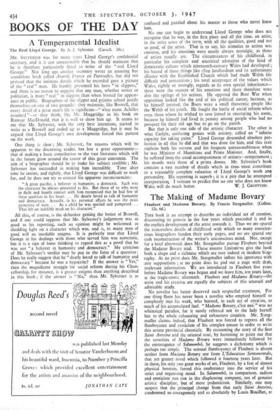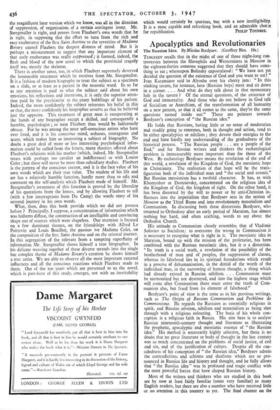The Making of Madame Bovary
THIS book is an attempt to describe an individual act of creation, discovering its genesis in the few years which preceded it and in the explicit development of the artist towards it. Thus we are spared the remorseless details of childhood with which so many conscien- tious biographers burden their early pages, and we are spared any rash reconstruction of the writer's unconscious mind. Nor, except for a brief afterword, does Mr. Steegmuller pursue Flaubert beyond the Madame Bovary trial. These austere 1:mitatiens give the book both a shape and a richness which are rare indeed in modern biog- raphy. At no point does Mr. Steegmuller inflate his ignorance with airy suppositions ; at no point does he pad out a page with drab, irrelevant information. We are introduced to Flaubert five years before Madame Bovary was begun and we leave him, ten years later, at the tragic-comic aftermath. Flaubert and Madame Bovary—the artist and his creation are equally the subjects of this unusual and admirable study.
No novelist has better deserved such respectful treatment.. For one thing there has never been a novelist who emptied himself so completely into his work, who burned, in each act of creation, so much of his accumulated fuel. " Madame Bovary, c'est moi " was no whimsical paradox, for it surely referred not to the lady herself but to the whole exhausting and exhaustive creation. Mr. Steeg- muller claims, indeed, that Flaubert was forced to repress all the flamboyance and exoticism of his complex nature in order to write this severe provincial chronicle. By recounting the story of the first Saint Antoine and the oriental tour, by hastening to point out that the severities of Madame Bovary were immediately followed by the extravagance of Salammbo, he suggests a dichotomy which is perhaps too simple. The sensual flamboyance of Flaubert is absent neither from Madame Bovary nor from L'Education Sentimentale, that yet greater novel which followed it fourteen years later. But in these, his only two great works of art, Flaubert. by a feat of almost physical heroism, forced this exuberance into the service of his strict and organising mind. In Salamtnbo, in comparison, sadism and exoticism run riot in the displeasing company, not of genuine artistic discipline, but of mere pedanticism. Similarly, one may suspect that the principal change from that early Saint Antoine, condemned so courageously and so absolutely by Louis BoUilhet, to the magnificent later version which we know, was all in the direction of suppression, of organisation, of a certain astringent irony. Mr. Steegmuller is right, and proves from Flaubert's own words that he is right, in supposing that the effort to turn from the rich and easy exuberance of the first Saint Antoine to the severities of Madame Bovary caused Flaubert the deepest distress of mind. -But it is perhaps a misstatement to suggest that any important element of that early exuberance was really suppressed ; it formed, indeed, the flesh and blood of the new novel to which the provincial tragedy itself was merely the skeleton. There is another sense, too, in which Flaubert supremely deserved the honourable treatment which he receives from Mr. Steegmuller. It is a fashion of modern biography to treat the subject as a specimen on a slide, or at .least as a patient in the neurotic ward. In so far as any attention is paid to what the subject said about his own emotions, his reflections and intentions, it is only the superior atten- tion paid by the psychiatrist to the crazy babblings of his patient. Indeed, the more confidently the subject reiterates his belief in this or that, the more confidently his biographer assures us that he believed just the opposite. This treatment of great men is exasperating at the hands of any biographer except a skilled, and consequently a humble, psychologist ;, to treat Flaubert thus would be ludicrously obtuse. For he was among the most self-conscious artists who have ever lived, and it is his conscious mind, arduous, courageous and acute, which makes him so interesting a subject of biography. No doubt a great deal of more or less interesting psychological infor- mation could be culled from the letters, many theories offered about Flaubert's relations with his mother (which, indeed, Mr. Steegmuller treats with perhaps too cavalier an indifference) or with Louise Colet ; but these will never be more than subsidiary studies. Flaubert is the pattern of the conscious creator, and it is the face value of his own words which are their true value. The student of his life and art has a relatively humble function, hardly more than to edit and comment on the self-analysis which Flaubert made of himself. Mr. Steegmuller's awareness of this function is proved by the liberality of his quotations from the letters, and by allowing Flaubert to tell (with a few interruptions from Du Camp) the whole story of his oriental journey in his own words.
What, then, does this book provide which we did not possess before ? Principally, I suppose, a concentration of information which was hitherto diffuse, the construction of an intelligible and convincing shape out of sources which were shapeless. Our attention is focused on a few dominant themes, on the friendships with Alfred Le Poittevin and Louis Bouilhet, the passion for Madame Colet, on the composition of the first Saint Antoine and on the oriental journey. In this segregation of the relevant from a tempting superfluity of information Mr. Steegmuller shows himself a true biographer. In his delicate weaving together of these diverse strands into the single but complex theme of Madame Bovary's creation he shows himself a true artist. We are able to observe all the most important external influences and all the conscious reactions which Flaubert made to them. Out of the ten years which are presented to us the novel, which is part-hero of this study, emerges, not with an inevitability which would certainly be spurious, but with a new intelligibility. It is a most capable and refreshing book, and an admirable choix



































 Previous page
Previous page